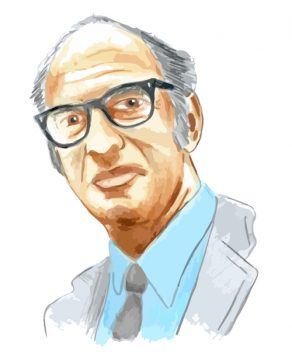John Horgan in Scientific American:
 I’m recovering from flu, so I’ve spent more time than usual by myself lately, with odd ideas swirling around in my feverish brain. Recently a bunch of different thoughts–about Thomas Kuhn, AIDS denialism, George Bush, Errol Morris, Trump and of course the coronavirus—clumped together in a way that made me think: blog post! I’ll start with Kuhn. He is the philosopher of science who argued, in his 1962 book The Structure of Scientific Revolutions, that science can never achieve absolute, objective truth. Reality is unknowable, forever hidden behind the veil of our assumptions, preconceptions and definitions, or “paradigms.” At least that’s what I thought Kuhn argued, but his writings were so murky that I couldn’t be sure. When I interviewed him in 1991, I was determined to discover just how skeptical he really was.
I’m recovering from flu, so I’ve spent more time than usual by myself lately, with odd ideas swirling around in my feverish brain. Recently a bunch of different thoughts–about Thomas Kuhn, AIDS denialism, George Bush, Errol Morris, Trump and of course the coronavirus—clumped together in a way that made me think: blog post! I’ll start with Kuhn. He is the philosopher of science who argued, in his 1962 book The Structure of Scientific Revolutions, that science can never achieve absolute, objective truth. Reality is unknowable, forever hidden behind the veil of our assumptions, preconceptions and definitions, or “paradigms.” At least that’s what I thought Kuhn argued, but his writings were so murky that I couldn’t be sure. When I interviewed him in 1991, I was determined to discover just how skeptical he really was.
Really, really skeptical, it turned out. We spoke for several hours in Kuhn’s office at MIT, and I found myself sticking up for the idea that science gets some things right. At one point, I told Kuhn that his philosophy applied to fields with a “metaphysical” cast, like quantum mechanics, but not to more straightforward realms, like the study of infectious diseases. As an example, I brought up AIDS. A few skeptics, notably virologist Peter Duesberg, were questioning whether the so-called human immunodeficiency virus, HIV, actually causes AIDS. These skeptics were either right or wrong, I said, not just right or wrong within the context of a particular social-cultural-linguistic context. Kuhn shook his head vigorously and said:
I would say there are too many grounds for slippage. There’s a whole spectrum of viruses involved. There’s a whole spectrum of conditions of which AIDS is one or several or so forth… I think when this all comes out you’ll say, Boy, I see why [Duesberg] believed that, and he was onto something. I’m not going to tell you he was right, or he was wrong. We don’t believe any of that anymore. But neither do we believe anymore what these guys who said it was the cause believe… The question as to what AIDS is as a clinical condition and what the disease entity is itself is not — it is subject to adjustment. And so forth. When one learns to think differently about these things, if one does, the question of right and wrong will no longer seem to be the relevant question.
